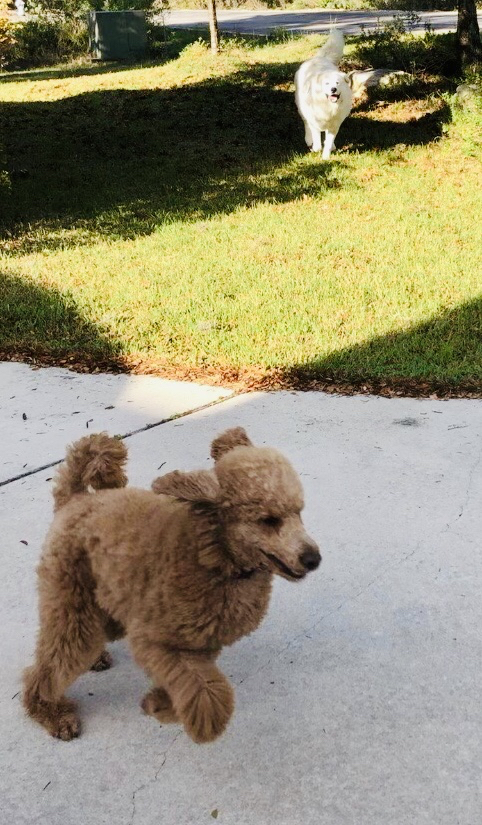I free spiritedly let my standard poodle Chester outside to greet his friend, Rosie, the gentle Great Pyrenees. Seconds later, they are racing for the street. I remember every detail of the accident, especially that feeling of helplessness.
The quiet, awful sound of the impact, the still air, my heart beating in my chest, his breath coming fast and shallow. There’s an initial sliver of hope, that oh, maybe it’s not that bad. Then my brain quickly moves past hope, to possible internal injuries.
I don’t freak out. I switch into problem-solving mode, scooping him up, putting him on my sweater in the back seat of my VW, driving to the pet hospital in a neighboring small town.
Quick assessment and action has always been my modus operandi. I cry later.
Time slows, and I step outside of the situation to solve the problem. While this is happening, I feel strangely devoid of emotion. I completely focus on repairing the damage, trying to make it like it never happened.
Sometimes I wonder if there’s something wrong with me. On some level, I believe that if I try, really, really hard, with extreme focus, I can accomplish anything.
Who do I think I am? I don’t control the story!
I know we are supposed to feel our feelings, let them wash through us, then let them go. But I’m wired to assess and act. Maybe I would’ve made a good fighter pilot or ER surgeon. I delay a freak-out and move swiftly to minimize fallout. This detached, unnatural feeling is one I recognize, over and over again in my life. It’s a disconnected, hard way to live.
If we torture ourselves and berate ourselves for not being perfect, somehow our brains feel better about the situation. At least we have done something to right the wrong, even if the only outcome is our own suffering.
After the accident, Chester trembles in shock. I pace, cold and shivering in the veterinary ER. I wait, zombie-like, to hear about his leg, wait to hear about possible internal injuries, wait to see if he will survive.
His tibia is completely broken, but may be fixable with a steel plate and 6 screws. We waive resuscitation permission (odds for success without brain damage are low) and agree to surgery. The best possible outcome?
Complete bionic recovery–like it never happened.
As medieval as the implant seems, the chance for success is too hard for me to resist. The bigger challenge will be to keep him calm for a full 6 weeks. This means never letting him rear up on his hind legs to greet us, or launch to land on a comfy sofa or bed.
Chester used to leap from the top of the deck over 7 steps to land in the soft grass on a high-speed squirrel chase. It’s a purely joyful thing to behold. Now, my entire focus is quashing this explosion of movement.
He’s on leash 24/7, do-able for the first 2-3 weeks, thanks to heavy medication. After that, he gradually regains his zest for activity, but to save the leg, we still must restrain him. He’s sad, but safe.
As you can see, I’ve gotten myself into a perfectly terrible position for a control freak.
His exuberant nature requires constant, exhausting vigilance. It reminds me of times in my life where I endlessly poured on the effort to succeed – in work, in relationships, in throwing a damn dinner party.
Take eyes off the puppy channel for just a moment, and he may spontaneously jump to the sofa or bed. This does happen and, I can tell, sometimes it hurts him. Even with hyper-vigilance, I fail.
I’ve been determined to succeed, because a lapse could mean that the plate is compromised and he loses the leg. He could lose his leg.
The responsibility is almost unbearable. I pay my penance by calling forth all my controlling energies. I owe it to him, for not being a more careful parent.
Consistency and routine are not my strong points, so I make up for it by also being super controlling and hyper-responsible. So much fun.
My job in life has been a nonstop effort to hold things together. For years, I lived on coffee and cortisol, in pursuit of non-failure (nothing like a high bar). I wish I could’ve relaxed and just enjoyed my family life and raising my son. I adore him and remember so many sweet moments, thanks to his distinctly silly/serious nature. But multi-tasking left me stressed and impatient.
I forgive myself (mostly) for my anxieties during that time and, today I don’t live that way anymore, at least not so much. I accept that some things cannot be fixed.
Now, I can get a little more comfortable with being uncomfortable.
When I feel most out of control – like when the accident happened — my response is to step outside myself and seize control. I feel my fear, but I want to stop feeling the fear. I want to put all the pieces back the way they were. I want to rewrite reality.
I see you, coping strategies. You’ve been my companion since childhood, but you are not saving me from fear. You are leaving me disconnected from myself and feeling very, very alone.
I release you, old friend. Rest now.
From “When Things Fall Apart”, by Pema Chodron:
“What we’re talking about is getting to know fear, becoming familiar with fear, looking it right in the eye—not as a way to solve problems, but as a complete undoing of old ways of seeing, hearing, smelling, tasting, and thinking. The truth is that when we really begin to do this, we’re going to be continuously humbled. There’s not going to be much room for the arrogance that holding onto ideals can bring.”
The accident set off my fear, and set my old controlling patterns into motion. The difference is, now I can see it happening. I can taste the arrogance on my tongue.
Things are always falling apart, aren’t they? If I can sit with my fear and my broken heartedness, and not spin out into control and guilt, I can live through the painful times. I can find healing and acceptance for what’s going on in my little house–and in the world—right now.
I love my friends and family the way they are, and respect that they make their own decisions. It’s not in my control.
I take good care of my bouncy, bionic pup, but I cannot change his nature, nor do I want to. He’s pretty perfect, just the way he is. He may live another ten energy-charged years, or he may not. It’s not in my control.
I don’t know what the outcome will be, but I do know that I can not only live through it, but also gather up baskets of joyous moments along the way.











Read 6 comments and reply